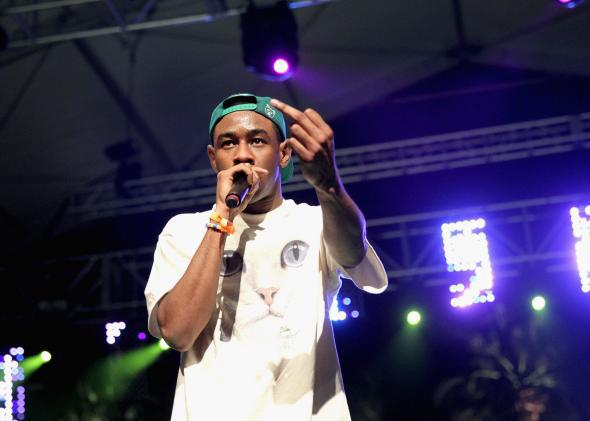The politics of derogatory language reclamation have become tedious. Reasonable people could continue to debate endlessly, for example, the acceptability of in-group usage of words like nigger or faggot, or whether even a comparatively low-voltage phrase like the gays can be innocently employed by a straight writer. As with antiquing, vintage-slur recuperating is a pastime that excites some with its promise of newly polished and repurposed words but that many others will always find offensively retrograde.
That said, a pair of news items fluttering about today broaches the issue in a way interesting enough to consider, at least briefly. In the first, rapper and designer Tyler the Creator spoke last week on The Arsenio Hall Show about his controversial use of the word faggot. “That’s just a word,” Tyler opined. “You can take the power out of that word. The way that I see things, you chose to be offended if you care more about stuff like that.”
The 22-year-old artist then went on to point out that his friend Frank Ocean has chosen not to mind—which, for me, is irrelevant. But the “choice” claim is an intriguing one: Are we really so free to choose what offends us? Do all people share this freedom equally?
That question bears on the second story, about the shock 66-year-old gay Pennsylvanian John Kichi experienced during his recent job search with Colorado College. As the Denver Post reports, Kichi found that the school allows applicants a range of choices with regard to an optional gender-identity query, including the term queer. “I couldn’t believe it,” Kichi told the Post. “I thought I was going to have a stroke. It’s totally from the Dark Ages.” Though the school explained the reclamation of the word—especially in academic contexts—Kichi maintains that it should be “against the law” and has sent a complaint to Colorado’s attorney general.
Though the portrait of Kichi is admittedly vague (i.e. he could be trolling), one gets the sense that he is not a bitter scold, but, rather, an older gay man who truly cannot understand “queer” in any context other than in the way it had been used to denigrate him in the past. (He told the Post that he had “lost jobs and homes” because of his sexual orientation.) This means, of course, that he has somehow avoided all the progressive activism and “queer theory” developments of the last few decades that have done much to complicate the meaning of the term, but stranger things have happened. Given Kichi’s specific history, is it really fair to say that he should (or even could) simply “choose” not to be offended by queer?
I’m not suggesting that Kichi’s or any specific person’s situation should determine larger policy. But as we weight word usage and the limits of reclamation in the public sphere, it is worth considering whether a cavalier attitude like Tyler’s is as egalitarian as it might first appear.
